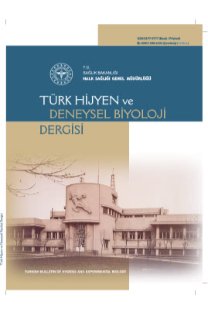Ahmet KARAKAŞ, Gürkan MERT, Ömer ÇOŞKUN, Ömer Hilmi ALGA, Bülent Ahmet BEŞİRBELLİOĞLU, Can Polat EYİGÜN
S19 Hayvan Aşısının Kazayla İnokülasyonu Sonucu Gelişmiş Bir Bruselloz Olgusu
Bruselloz, gram negatif kokobasil olan Brucella cinsi bakterilerin neden olduğu, insanlarda ateş, terleme, kas ve eklem ağrısı gibi belirtilerle seyreden bir zoonotik hastalıktır. Bruselloz esas olarak enfekte hayvanlarla temas ve enfekte süt-süt ürünlerinin tüketilmesi ile bulaşmasına rağmen, literatürde aşı kaynaklı olgular da nadiren bildirilmektedir. Burada; genç sığırların aşılanması sırasında canlı Brucella abortus S19 aşısına maruz kalan bir veteriner hekimde gelişen mesleki bruselloz olgusu sunulmuştur. Yirmi dört yaşındaki erkek veteriner hekim, B. abortus S19 aşısı ile sığırları aşılarken aşıyı yanlışlıkla sol el başparmağına inoküle etmiştir. Hasta, aşı inokülasyonundan 36 saat sonra Kocaeli Özel Konak Hastanesine başvurmuştur. İlk müracaat ettiğinde aşı inokülasyon yerinde ödem, şişlik ve hassasiyet saptanmış, diğer fizik muayene bulguları normal olarak değerlendirilmiştir. Başlangıçta çalışılan serolojik testler Rose Bengal ve serum tüp aglütinasyon testi negatif, rutin biyokimyasal testler ise normal sınırlarda bulunmuştur. Ayrıca inokülasyon yerinden alınan yara kültüründe bakteri izole edilememiştir. Hasta, doksisiklin ile kemoproflaksi uygulanmasına rağmen olaydan 21 gün sonra ateş, terleme ve testis ağrısı ile tekrar başvurduğu ikinci müracaatında ateşi 38,3 OC olarak saptanmış, inokülasyon bölgesinde fleksiyon sırasında ağrı ve gerginlik yakınması olduğu belirlenmiştir. Laboratuvar incelemesinde aspartat aminotransferaz AST 32 U/L, alanin aminotransferaz ALT 25 U/L, CRP 8,94 mg/dL, serolojik incelemede
Anahtar Kelimeler:
Bruselloz, Brusella aşıları, Mesleki temas, Veteriner, S19 aşısı
A Case of Human Brucellosis Associated with Unintentional Inoculation of the Animal Vaccine S19
Brucellosis is a zoonotic disease caused by Brucella species that is a gram negative coccobacilli and can cause symptoms such as fever, diaphoresis, arthalgia and myalgia. Although humans become infected by contact with animals or consuming dairy products that are contaminated with Brucella, cases in which humans are infected by vaccination are rarely mentioned in the literature. Here, we present the a case of a 24-year old veterinarian who was diagnosed with brucellosis upon being exposed to Brucella abortus S19 while vaccinating a young cattle and accidentally inoculating the pathogen to the thumb of his left hand. He was admitted to the Kocaeli Özel Konak hospital 36 hours after the inoculation with an edema and sensitivity to pressure in the innoculation site, while the other physical examination findings were normal. At this stage theserological tests Rose Bengal and agglutination were negative, while the routin biochemical tests were within normal range. In addition, samples collected from the inoculation site didn’t show any bacterial growth. Despite chemoprophylactic treatment with doxycycline, the patient developed fever, diaphoresis, and testicular pain 21 days after the contact. His body temperature was 38.3 OC and the patient complained about pain when the finger was bended during his second visit. Laboratory tests showed the aspartat aminotransferaz AST level was 32 U/L, alanin aminotransferaz ALT 25 U/L, and CRP 8.94 mg/dL. The
Keywords:
Brucellosis, Brucella Vaccines, Occupational Exposure, Veterinerian, S19 Vaccine,
___
- Young EJ. Brucella species. In: Mandell GL, Bennet JE, Dolin R (eds). Mandell, Douglas, and Bennett’s Principles and Practice of Infectious Diseases, 6th ed. Philadelphia, Churchill Livingstone, 2005; 2669-74.
- 2. Kotton C.N., Zoonoses in solid-organ and hematopoietic stem cell transplant recipients. Clin Infect Dis, 2007; 44 (6): 857-66.
- 3. Meltzer E, Sidi Y, Smolen G, Banai M, Bardenstein S, Schwartz E. Sexually transmitted brucellosis in humans. Clin Infect Dis, 2010; 51 (2): 12-5.
- 4. Ashford DA, di Pietra J, Lingappa J, Woods C, Noll H, Neville B. et al., Adverse events in humans associated with accidental exposure to the livestock brucellosis vaccine RB51. Vaccine, 2004; 22 (25-26): 3435-9.
- 5. Bardenstein S, Mandelboim M, Ficht TA, Baum M, Banai M. Identification of the Brucella melitensis vaccine strain Rev.1 in animals and humans in Israel by PCR analysis of the PstI site polymorphism of its omp2 gene. J Clin Microbiol, 2002; 40 (4): 1475-80.
- 6. Centers for Disease Control and Prevention. Human exposure to Brucella abortus strain RB51-Kansas, 1997. MMWR Morb Mortal Wkly Rep, 1998; 47 (9): 172-5.
- Young EJ. Brucella species. In: Mandell GL, Bennet JE, Dolin R (eds). Mandell, Douglas, and Bennett’s Principles and Practice of Infectious Diseases, 6th ed. Philadelphia, Churchill Livingstone, 2005; 2669-74.
- 2. Kotton C.N., Zoonoses in solid-organ and hematopoietic stem cell transplant recipients. Clin Infect Dis, 2007; 44 (6): 857-66.
- 3. Meltzer E, Sidi Y, Smolen G, Banai M, Bardenstein S, Schwartz E. Sexually transmitted brucellosis in humans. Clin Infect Dis, 2010; 51 (2): 12-5.
- 4. Ashford DA, di Pietra J, Lingappa J, Woods C, Noll H, Neville B. et al., Adverse events in humans associated with accidental exposure to the livestock brucellosis vaccine RB51. Vaccine, 2004; 22 (25-26): 3435-9.
- 5. Bardenstein S, Mandelboim M, Ficht TA, Baum M, Banai M. Identification of the Brucella melitensis vaccine strain Rev.1 in animals and humans in Israel by PCR analysis of the PstI site polymorphism of its omp2 gene. J Clin Microbiol, 2002; 40 (4): 1475-80.
- 6. Centers for Disease Control and Prevention. Human exposure to Brucella abortus strain RB51-Kansas, 1997. MMWR Morb Mortal Wkly Rep, 1998; 47 (9): 172-5.
- ISSN: 0377-9777
- Başlangıç: 1938
- Yayıncı: Türkiye Halk Sağlığı Kurumu
Sayıdaki Diğer Makaleler
Diyaliz Sularının Mikrobiyal Kontaminasyon ve Bakteriyel Endotoksin Testleri İle Kontrolü
Kauçuk yapıda Foley idrar sondalarının sitotoksisitesinde çinko bileşiklerinin olası rolü
Mehmet Kürşat DERİCİ, Hakan BÜZKAYA, Ferat ŞAHİN
Erdal POLAT, Serhat SİREKBASAN, Burcu AYDIN, Zehra YILDIRIM, Yaşar BAĞDATLI, İsmail ÇEPNİ, Tayfur ÇİFT, Nezihe D. BALTALI
Gıdalarda Aflatoksin Varlığının Değerlendirilmesi
S19 Hayvan Aşısının Kazayla İnokülasyonu Sonucu Gelişmiş Bir Bruselloz Olgusu
Ahmet KARAKAŞ, Gürkan MERT, Ömer ÇOŞKUN, Ömer Hilmi ALGA, Bülent Ahmet BEŞİRBELLİOĞLU, Can Polat EYİGÜN
Ahmet ÇARHAN, Nurhan ALBAYRAK, Ayşe Başak ALTAŞ, Yavuz UYAR, Etem ÖZKAYA
